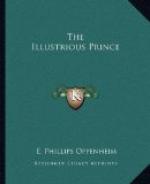“I think,” the Prince continued, “that the greatest and the most subtle of all policies is the policy of perfect truthfulness. Listen to me, then. The thing which you have in your mind concerning me is true. Two years I have spent in this country and in other countries of Europe. These two years have not been spent in purposeless travel. On the contrary, I have carried with me always a definite and very fixed purpose.”
The Prime Minister and Bransome exchanged rapid glances.
“That has been our belief from the first,” Bransome remarked.
“I came to Europe,” the Prince continued gravely, “to make a report to my cousin the Emperor of Japan as to whether I believed that a renewal of our alliance with you would be advantageous to my country. I need not shrink from discussing this matter with you now, for my report is made. It is, even now, on its way to the Emperor.”
There was a moment’s silence, a silence which in this corner of the great room seemed marked with a certain poignancy. It was the Prime Minister who broke it.
“The report,” he said, “is out of your hands. The official decision of your Government will reach us before long. Is there any reason why you should not anticipate that decision, why you should not tell us frankly what your advice was?”
“There is no reason,” the Prince answered. “I will tell you. I owe that to you at least. I have advised the Emperor not to renew the treaty.”
“Not to renew,” the Prime Minister echoed.
This time the silence was portentous. It was a blow, and there was not one of the three men who attempted to hide his dismay.
“I am afraid,” the Prince continued earnestly, “that to you I must seem something of an ingrate. I have been treated by every one in this country as the son of a dear friend. The way has been made smooth for me everywhere. Nothing has been hidden. From all quarters I have received hospitality which I shall never forget. But you are three just men. I know you will realize that my duty was to my country and to my country alone. No one else has any claims upon me. What I have seen I have written of. What I believe I have spoken.”
“Prince,” Mr. Haviland said, “there is no one here who will gainsay your honesty. You came to judge us as a nation and you have found us wanting. At least we can ask you why?”
The Prince sighed.
“It is hard,” he said. “It is very hard. When I tell you of the things which I have seen, remember, if you please, that I have seen them with other eyes than yours. The conditions which you have grown up amongst and lived amongst all your days pass almost outside the possibility of your impartial judgment. You have lived with them too long. They have become a part of you. Then, too, your national weakness bids your eyes see what you would have them see.”
“Go on,” Mr. Haviland said, drumming idly with his fingers upon the table.




